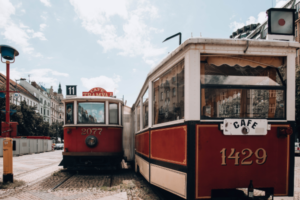Coffee is much more than a simple beverage that helps us start the day. It’s a link between cultures, a social ritual, and a sensory journey that leads us to explore the deepest flavors and aromas. Over the centuries, coffee has transformed from a mere infusion into a fascinating narrative of global trade, agricultural innovation, and deep-rooted traditions. From its earliest traces of consumption in ancient societies to the proliferation of modern coffee shops, the history of coffee bears witness to the human connection with the land, trade, and the unrelenting pursuit of gustatory pleasure.
In this niche article, we will delve into the rich stories behind that cup of coffee, exploring how this unique beverage traversed continents, influenced entire economies, and became an inseparable part of the daily lives of millions. We will uncover the origins of coffee, from its legendary lore to its domestication and dissemination around the world. Along this journey, we will also discover how different regions and cultivation methods gave rise to a wide variety of flavor profiles, enriching the palates of enthusiasts and aficionados.
Our goal is to offer a comprehensive and engaging perspective on coffee, from the stories of pioneers who shaped the industry to the sustainable farming practices that sustain its cultivation today. Furthermore, we will explore how coffee’s journey is not confined solely to its production and consumption, but also plays a vital role in the cultural identities and social experiences of communities worldwide.
As we immerse ourselves in the history of coffee and its many branches, we hope to open readers’ eyes to the complexity behind this seemingly simple beverage. Coffee is a story that goes far beyond the roasted bean and hot water – it is a gateway to exploring global interconnectedness, cultural traditions, and sensory richness that enrich our lives in ways often unnoticed.
The Origins of Coffee: A Legendary Tale
The origins of coffee can be traced back to ancient times, with a legendary tale from Ethiopia. According to popular belief, a goat herder named Kaldi noticed his goats becoming energized after consuming red berries from a particular plant. Curiosity led Kaldi to try the berries himself, experiencing a newfound alertness. This discovery eventually led to the cultivation and spread of coffee.
From Ethiopia to Arabia: The Birth of Coffee Culture
Coffee cultivation expanded from Ethiopia to the Arabian Peninsula in the 15th century. The Arab world embraced coffee, and it quickly became an integral part of their culture. Coffee houses, known as qahwah, emerged as vibrant social hubs where people gathered to engage in intellectual discussions, listen to music, and share stories.
Coffee Conquers Europe: The Age of Enlightenment
Coffee reached Europe in the 17th century and sparked a revolution in social interaction and intellectual pursuits. Coffee houses became centers of intellectual exchange, attracting philosophers, writers, and artists. The stimulating effects of coffee were believed to enhance mental clarity, fostering the intellectual ferment of the Age of Enlightenment.
The Rise of Coffee Plantations: Colonialism and Expansion
The demand for coffee grew exponentially, leading to the establishment of large-scale plantations in colonies across the world. European powers, such as Portugal, France, and the Netherlands, sought to control coffee production, leading to the exploitation of indigenous populations and the transatlantic slave trade. This dark chapter in coffee’s history highlights the complex interplay between economics, colonialism, and social injustice.
Coffee Reaches the Americas: A New Era of Cultivation
In the 18th century, coffee cultivation expanded to the Americas, particularly Brazil and the Caribbean. The fertile soils and favorable climates of these regions proved ideal for coffee production. Plantations grew, and coffee became a significant driver of economic growth in the New World.
The Industrial Revolution and Coffee: From Bean to Brew
The industrial revolution of the 19th century transformed the coffee industry. Innovations in transportation and machinery allowed for faster and more efficient processing, packaging, and distribution of coffee. This led to increased accessibility and affordability, making coffee a staple in households worldwide.
Specialty Coffee: A Quest for Quality
In recent decades, a movement known as specialty coffee has emerged. It focuses on the pursuit of exceptional quality, emphasizing factors such as the origin, cultivation, and processing methods of coffee beans. Specialty coffee has revolutionized the industry, elevating the appreciation and enjoyment of coffee to new heights.
Coffee Rituals: From Traditional to Modern
Coffee has inspired various rituals and brewing methods throughout history. From the traditional Turkish coffee preparation to the precise techniques of espresso-making, each culture and era has developed its own unique way of extracting flavors from coffee beans. Modern coffee culture continues to evolve, with alternative brewing methods, such as pour-over, French press, and cold brew, gaining popularity.
The Global Coffee Trade: Economics and Challenges
The global coffee trade is a massive industry that impacts the livelihoods of millions. Coffee-producing countries heavily rely on coffee exports, while consuming nations eagerly await the arrival of their favorite blends. However, the industry faces challenges such as price volatility, environmental sustainability, and fair trade practices, prompting increased efforts for ethical and sustainable sourcing.
Coffee and Health: Benefits and Considerations
Coffee has been a subject of scientific research regarding its potential health benefits and risks. Studies have suggested that moderate coffee consumption can be associated with reduced risks of certain diseases, such as Parkinson’s disease and type 2 diabetes. However, individual responses to caffeine can vary, and excessive consumption may lead to adverse effects. Understanding personal limits and considering individual sensitivities is crucial.
Coffee Culture Around the World: Diversity in a Cup
Coffee culture varies significantly from one country to another. From the strong and concentrated espresso shots of Italy to the elaborate coffee ceremonies in Ethiopia, each culture brings its own unique traditions, flavors, and social customs to the world of coffee. Exploring these diverse coffee cultures can be a fascinating way to connect with different societies and their histories.
The Future of Coffee: Sustainability and Innovation
As the world faces environmental challenges and the need for sustainable practices, the coffee industry has taken steps to mitigate its impact. From promoting organic farming methods to investing in renewable energy and reducing waste, coffee producers and consumers alike are embracing sustainability. Additionally, advancements in technology and research continue to push the boundaries of coffee innovation, promising exciting possibilities for the future.
Coffee and Art: A Creative Partnership
Throughout history, coffee has had a close relationship with the arts. From the vibrant café culture of Paris in the 19th century, which inspired renowned artists like Van Gogh and Picasso, to the modern-day coffee shop serving as a haven for writers, musicians, and visual artists, coffee has provided a creative backdrop for artistic expression. The cozy ambiance, the stimulating effects of caffeine, and the sense of community found in coffee establishments have fueled countless artistic endeavors.
The Psychology of Coffee: The Rituals and Effects
Coffee is more than just a beverage; it has psychological and social dimensions as well. The rituals associated with brewing and consuming coffee, such as the morning routine or the mid-afternoon coffee break, can have a calming and comforting effect on individuals. The caffeine in coffee acts as a stimulant, enhancing alertness and concentration. Understanding the psychological and social aspects of coffee can provide insights into why it holds such a special place in our lives.
Coffee in Popular Culture: From Films to Fashion
Coffee has permeated popular culture, appearing in films, literature, music, and even fashion. Iconic movie scenes set in coffee shops, memorable literary characters sipping coffee as they contemplate life’s mysteries, and coffee-inspired fashion trends all contribute to the coffee’s omnipresence in our cultural landscape. Coffee’s portrayal in popular culture not only reflects its significance in our daily lives but also reinforces its status as a symbol of relaxation, intellectualism, and social connection.
Conclusion
Coffee’s journey throughout history and its continued relevance in modern society make it more than just a beverage—it is a cultural phenomenon. From its legendary origins to its profound impact on global trade, coffee’s story is intertwined with humanity’s evolution. As we embark on our own personal coffee journeys, exploring diverse flavors, brewing methods, and cultural traditions, let us appreciate the rich tapestry of history, art, psychology, and popular culture that coffee brings to our lives. So, the next time you take a sip of your favorite brew, remember that you are not just indulging in a delicious beverage; you are participating in a centuries-old tradition that has shaped the world and continues to awaken palates and inspire minds.



